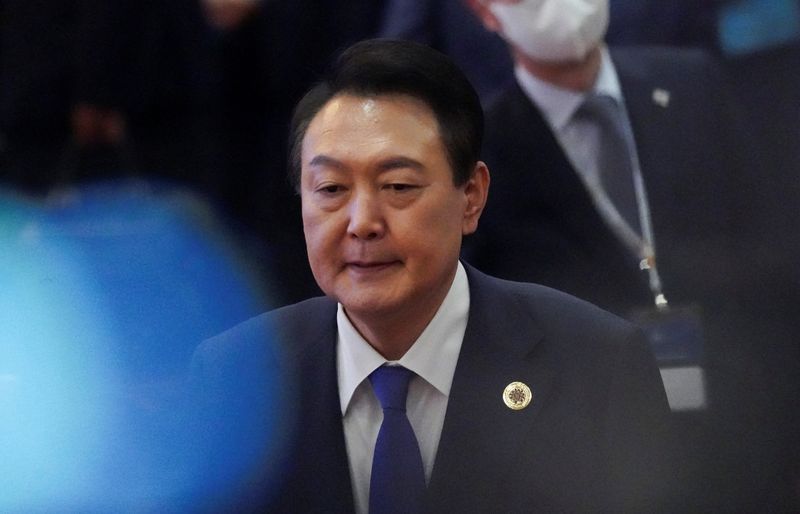
By Joo Min Park and Heekyeong Yang
SEOUL (Reuters) – South Korean President Yoon Sok-yul warned that the government might intervene to end a nationwide strike by truck drivers, calling it an illegal and unacceptable move to take the national supply chain “hostage” during an economic crisis.
Thousands of unionized truck drivers began their second major strike to demand better wages and working conditions in less than six months on Thursday. The measure has already disrupted supply chains in the world’s 10th largest economy, affecting automakers, the cement industry and steel producers.
Union officials told Reuters that there is no ongoing negotiation or dialogue with the government. The country’s transportation ministry said it had requested dialogue with the union on Thursday, but the two parties have yet to agree on a date.
Union officials estimated that about 25,000 people joined the strike, out of about 420,000 transport workers in South Korea. About 7,700 people are expected to take part in the strike on Friday at 164 locations nationwide, the Transportation Department said, down from 9,600 on Thursday.
“The public will not tolerate the logistics system being taken hostage in the face of a national crisis,” Yoon said in a Facebook message late Thursday, noting that exports were key to tackling economic instability and the volatility of financial markets.
“If the irresponsible denial of transportation continues, the government will have no choice but to review a number of measures, including the start-up order.”
According to South Korean law, during a serious disruption in transportation, the government may issue an order to compel transportation workers to return to their jobs. Failure to comply is punishable by up to three years in prison, or a fine of up to 30 million won (US$22,550).
If the government makes this choice, it will be the first time in South Korean history that such an order has been issued.
The strike comes after South Korea’s exports in October experienced the biggest drop in 26 months as the trade deficit extended for a seventh month, underscoring a slowdown in its export-dependent economy.
Amid the economic gloom, Yoon’s approval rating remained mostly flat for a fifth week at 30%, according to Gallup Korea on Friday, though his focus on economic affairs received a positive response.
Fixed Line Response
Outside the gate of the container depot at the transport hub Awang, dozens of unionized truck drivers have set up camp and are staying overnight in white tents watched by police patrols although the strike has so far been peaceful.
“We will inject everything, resources and money, and implement every strategy we have,” said Lee Young-ju, general manager at the Seoul branch of the Truckers Solidarity Union (CTSU).
Regardless of what funds are in hand, Lee said, the union will raise emergency funds among its members if the strike continues. “We are desperate, but the government and politicians count their political gains and do not listen to us sincerely,” he said.
Lee said that unlike the previous strike in June that focused on blocking transport of containers, cement and cars, the union planned to broaden its targets and disrupt supplies of groceries and fuel.
The union’s president, Lee Bong-ju, said the truck drivers had no choice but to strike after the government stalled negotiations.
“The Yun Seok-yul government is threatening a tough response without making any efforts to stop the strike,” he told reporters on Thursday.
On the first day of the strike, the Korea International Trade Association (KITA) received 19 reports of logistics disruptions. This included the inability to bring in raw materials, high logistics costs and delivery delays which led to sanctions and the cancellation of trade with overseas buyers.
KITA said that in one case, raw materials were delivered to a chemical company under police protection after striking truck drivers were denied entry to a plant.
The Korean lobby group, the Korea Cement Association, said the cement industry incurred production losses estimated at 19 billion won ($14.26 million) on Thursday, after shipments fell below 10,000 tons due to the strike.
This compares with South Korea’s cement demand of 200,000 tons per day in the peak season between September and early December. Construction sites run the risk of running out of building materials after the weekend.
The Industry Ministry said the steel sector also saw a drop in shipments on Thursday. POSCO, the country’s largest steelmaker, declined to comment on the range.
Meanwhile, a representative of a separate union at the plant told Reuters that workers at Hyundai Motor Company’s Ulsan plant are expected to drive about 1,000 new cars directly to customers on Friday, after delivering about 50 cars on Thursday. So far, the official said, there has been no impact on car production.
Drivers recruited by Hyundai Motor Logistics subsidiary Hyundai Glovis have also begun delivering some Kia Corp. vehicles by driving them directly from Kia’s Gwangju factory to customers, a Kia official told Reuters.
The official did not say how many Kia vehicles would be delivered directly to buyers.
($1 = 1,332.4700 won)
(Reporting by Jo Min Park, Joyce Lee and Haekyeong Yang; Additional reporting by Chun Sik Yu; Editing by Jerry Doyle and Kenneth Maxwell)




More Stories
Journalists convicted in Hong Kong sedition case
Stand News: Hong Kong journalists convicted of sedition in case critics say highlights erosion of press freedom
Shark decapitates teen off Jamaica coast